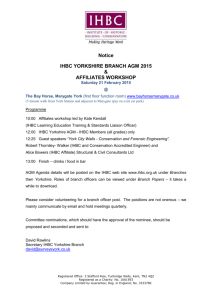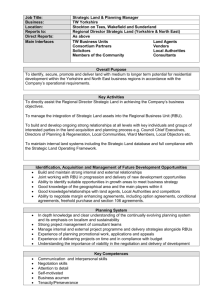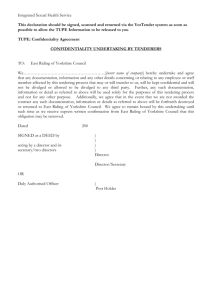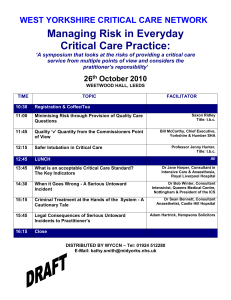Optegra Yorkshire Eye Hospital Quality Accounts 2012-2013
advertisement
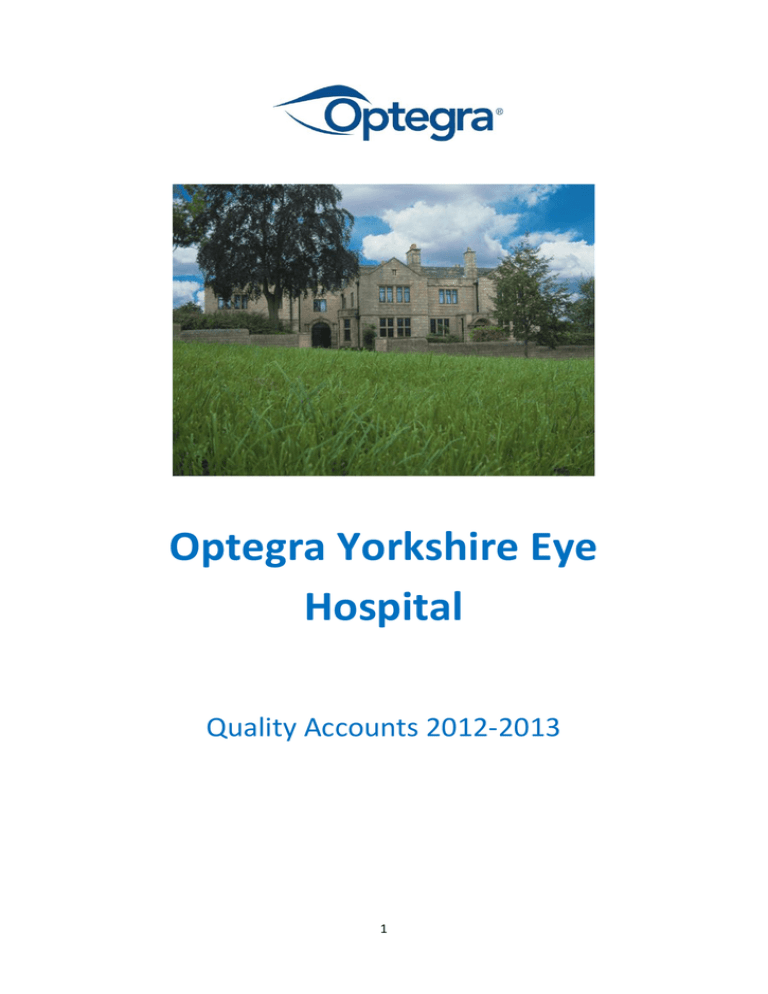
Optegra Yorkshire Eye Hospital Quality Accounts 2012-2013 1 CONTENT Part 1: Statement of Commitment Gareth Steer, Optegra UK Managing Director Part 2: Our Priorities for Improvement 2013 / 2014 Statement of Quality , Sue Boyes Hospital Manager Priorities for improvement Statement of Assurance Part 3: Review of our Quality Performance 2012 “A Look Back” 2 Part 1: Statement of Commitment Optegra UK ltd is totally committed to fostering an organisational culture that puts the patient at the centre of everything the Optegra Yorkshire Eye Hospitals does. The Optegra Yorkshire Eye Hospital was established by its founding surgeons specifically to demonstrate the highest levels of patient safety, clinical outcomes and customer satisfaction. It is that vision that remains at the heart of our dedication to the highest levels of quality and reflected in the Optegra mission statement - “To be the worlds most trusted choice for eye care" The hospital was acquired in February 2010 by Optegra UK, who specialise in Ophthalmology services across the country and is one of five hospitals based in the UK, with the others being situated in Surrey, Solent, Manchester, Birmingham and a recent opening in London. As Managing Director of Optegra UK, I am passionate about ensuring that high quality patient care is at the centre of all we do and how we operate in all our facilities. This relies not only on excellent medical and clinical leadership in our hospitals but also upon our overall continuing commitment to drive year on year improvement in clinical outcomes. Following the appointment of our new Head of Eye Sciences role in 2011, we have expanded the use of Medisoft, the UK's only Ophthalmology specific patient pathway system that records patient clinical data from onset to discharge. It has a comprehensive audit element that records both pre and post-surgical outcomes and also surgical and anaesthetic complications. For the first time Optegra UK will be able to produce consistent and high quality surgical outcome data for all of its hospitals. Our Head of Eye Sciences, in conjunction with our consultant Ophthalmologist Medical Director, will be instrumental in approving any new procedures and technologies into Optegra hospitals and will also enable us to participate in a wide range of research projects. As a provider of ophthalmic healthcare, we have continued to work hard in 2012 to synergise a structured clinical governance framework and risk management systems across all our hospitals and we will continually review our performance so we can drive improvements to the benefit of all our patients. I believe that delivering clinical excellence depends upon everyone in the organisation; everyone is responsible for ensuring that are delivering high levels performance and constantly seeking to improve. The requirement to ensure clinical excellence is the role of everyone in the organisation and is not about reliance upon one or two people. Across Optegra we nurture teamwork and professionalism, we value our people and set our targets high, and we work hard in every aspect of our services to provide facilities of a high order. We believe in investing substantially in our people, our hospitals and our equipment to ensure care is delivered in a consistent and safe manner at all times. 3 Patient feedback is extremely important to us and we will undertake a patient satisfaction survey in 2013 with the expectation we will maintain or improve upon our 2012 results of a patient “certain to recommend Optegra” rating of > 62%”. The Optegra Yorkshire Eye Hospital is accustomed to the disciplines of regulatory and contractual requirements to assure health commissioners of our clinical performance and to report complaints and serious incidents accordingly. The hospital maintains a Risk Register and reviews specific actions to achieve risk reduction. To the best or my knowledge as requested by the regulations governing the publication of this document, the information in this report is accurate. Gareth Steer, Optegra UK Managing Director 4 Optegra Yorkshire Eye Hospital Optegra Yorkshire Eye Hospital is a private hospital situated between Leeds and Bradford. The hospital offers care to NHS patients, patients with private medical insurance and patients who wish to fund their own treatments. The hospital provides a full range of Ophthalmic services, including outpatient consultations, diagnostics and surgery, through to follow-up care. During the period January 2012 – December 2012 the hospital has seen 15,128 patients through its doors, and approx. 50% were treated under the care of the NHS. Currently 25 specialist ophthalmic consultants work from the hospital and are supported by 17 clinical staff, a skill mix of Nurse’s, Healthcare Technicians and Optometrists and 15 Administration staff, along with dedicated Facilities and Housekeeping support. The hospital has built an excellent relationship with Leeds Teaching Hospital Trust, Bradford Teaching Hospitals and Airedale Foundation Trust to deliver a collaborative approach to patient care. Our field-based Professional Partnership Managers provide vital links to the Optometry community and GP’s to ensure their needs and expectation are managed through a partnership referral process and streamlined patient choice referrals. 5 Part 2: Statement of Quality: Hospital Manager Sue Boyes Optegra Yorkshire Eye Hospitals provides a full service directory of Ophthalmic procedures, including cataract, retinal and ocular plastics, it also provides a consultation only service to children from birth. We strongly believe in ensuring patients are fully informed about each step of their care. Our medical and clinical teams spend dedicated time on patient preparation for surgery; this not only reduces risk but alleviates patient anxiety. Patient feedback and involvement in their care and treatment is paramount as it helps us to ensure that we are delivering the right care and treatments that are evidence based and effective. We ensure our services are delivered by the most appropriate qualified clinicians and nurses with the relevant skills required. This is managed by a robust recruitment and training process. It is important to have the right role at the right time in order to deliver safe and excellent care. Through our integrated governance process we foster a "no blame culture" to ensure openness in reporting serious incidents, complaints, near misses and equipment failures. We have over 50 clinical and quality policies that are reviewed annually against national guidance. Specific work in collaboration with our commissioners has been undertaken in 2012 to align our polices on Safeguarding to Department of Health guidance, our clinical staff have now attended specific training for the safeguarding of adults and a resource/procedure file is available for all employees to refer to as required, our clinical services manager is the safeguarding/prevent lead. Robust processes have been put in place to allow staff to openly report abuse and notify the relevant body. Optegra UK and Optegra Yorkshire Eye Hospital are keen to learn throughout its organisation and implement and support changes in clinical practice to ensure patient safety at all times. 6 Part 2 Priorities for Improvement 2013/2014 The priorities for improvement have been determined by evaluating and acting upon our governance processes and learning from our patients and staff. The priorities are supported by the Medical Advisory Committee. We have a clear commitment to our patients and we work in partnership with the NHS to ensure our services are safe and of high quality. We constantly strive to improve clinical safety and standards by a process of governance, including audit and feedback from all those experiencing our services. Patient Safety 1, Never Events are serious and largely preventable patient safety incidents that should not occur if preventable measures have been put in place. There are 25 nationally recognised never events of which 4 are core to the hospital and will form part of our measurement of patient safety during 2013/14. Wrong site surgery – Optegra Yorkshire Eye Hospital has implemented the World Health Organisation (WHO) recommendation for safer cataract surgery checklist. The checklist is a tool used throughout cataract surgery to improve the safety of surgery by improving good communication and setting out safety checks throughout the perioperative period; the hospital had achieved a 100% compliance rate for completion of the checklist and will continue to audit and evaluate its use throughout 2013/14 . Wrong Implant / prosthesis – “Wrong intraocular lens implant; learning from reported patient safety incidents” (SP Kelly Feb 2011) showed that a large percentage of incidents of wrong implantation of IOL were due to wrong IOL selection. Optegra Yorkshire Eye Hospital experienced a Never Event of this category 7 in September 2012 despite the introduction of the Optegra wide lens check protocol in February 2012. A full investigation was undertaken and analysis showed Human Error as the root cause and ‘failure to follow the lens checking protocol in its entirety’ as the contributing factor. The learning points established from this event are; How critical it is to follow protocol and not exclude any part of the process. Not to become complacent with ‘routine’ checks as these are in place to protect our patients, consultants, clinical team members and our reputation. Recommendations from the investigation includes; a revision of the lens check protocol to introduce a ‘pause’ prior to any surgical intervention to allow the whole of the surgical team to agree the correct lens. The lens check protocol audit is now to be carried out on a monthly basis, under strict review and reported to the Integrated Governance Committee Steering Group on a Quarterly basis. The lessons learned from this event were 1. Communicated to all Optegra hospitals to ensure consistency within processes and share lessons learned. 2. The revised protocol was communicated to all Consultant users and all Clinical team members. 3. A flowchart for lens checking has been produced for display in the theatre to remind all team members of the correct process. 4. The changes were discussed via Clinical Governance, Medical Advisory Committee, Optegra Leadership Committee and the Clinical Team. 5. The monthly audit results to be shared. The monthly audit results show 100% compliance with the lens check protocol. (October 2012- March 2013). Optegra Yorkshire Eye hospital participated in ‘Safer Surgery Week’ in September 2012 which was a national campaign (NHS patient safety first) to further enhance patient safety. 8 During the week we introduced 1. Brief/ debrief sessions in theatre 2. Introduced the ‘stop the line’ principle 3. Invited 2 guests to observe our patient pathway and process The outcomes and observations from the week are as follows; The ‘team brief’ prior to commencing an operating session was carried out without exception. Changes to operating lists were identified and the list order changed prior to commencing therefore the whole team was aware of the changes. The brief identified alerts to the clinical team e.g. a latex allergy had been missed by the day care nurse but during the brief this was highlighted to the whole team involved and appropriate care given. The brief also identified any mobility issues patients have and allowed the team to plan the care of the patient more effectively. Equipment issues were discussed at the brief informing all of the team members and remedied prior to commencing; this reduced the ‘unexpected’ equipment problems. Conclusion: the Team Brief sessions were a great success and highlighted issues with patients and improved communication within the team. This best practice has continued since safer surgery week and has become embedded into the daily routine. We had 2 visitors to our theatres during the week (Optegra UK MD and the Head of Nursing and Clinical Governance for Bradford, Airedale and Leeds) their observations of our patient process are as follows: The patients commented that the staff and Consultants were friendly The information given to patients was clear and understandable, explanations were good and the patients were given the opportunity to ask questions The discharge information is quite extensive and the patient was not asked if they understood once the information had been given? could this part of the process be slower Not all patients were asked if they wanted a ‘hand holder’ Staff efficiency was very good and everyone knew their role and carried it out without any problems Lens check protocol was followed for every patient but the visitor did not hear the checks being verbalised Privacy/confidentiality in the day care rooms was a concern as all patients could hear each others details In the anaesthetic area the explanation of care was very good however the visitor did not hear an explanation for what will happen next 9 In theatre the patient checks were completed very well but the lens check protocol was not verbalised One patient was not warned that the drape was being removed at the end of the procedure In post-op the explanation was good but extensive, felt that patient understanding should be gained and then re-iterated to ensure To improve the patient experience could we re-assess our refreshments as they are poor On the whole these are very positive comments and we are very proud of our processes and the care we give. The lens checking protocol has been revised to introduce a ‘pause’ to enable the whole of the theatre team to check the lens prior to commencing surgery and to verbalise the lens type and dioptre. We will review our information given to patients particularly on discharge – a small team to look at this and report findings. In future all patients will be asked if they require a hand holder during their surgery. Clinical Team leader to discuss the day care rooms with the Hospital Manager with a view to improving confidentiality/privacy. All comments communicated to clinical staff and our consultants. The patients that were observed during the week gave very positive feedback to our visitors and suggested that they would recommend Optegra to their friends and family. The ‘stop the line’ principle was introduced during the week and although we did not need to use it, it is a valuable principle to retain and use in practice if and when required. The actions from safer surgery week will be considered and implemented during 2013/14. Retained Foreign Object Post Operation - this rarely occurs due to the nature of our surgery but extra vigilance will be undertaken due to the tiny microscopic sutures used sometimes. Surgical Safety (WHO) audit results show – March 2012- 98%; no evidence of signature on document July 2012 – 97%; non verbalization of the ‘sign out’ stage witnessed October 2012 – 98%; no evidence of signature on document February 2013 – 100% 10 Overdose of Midazolam during conscious sedation – minimal procedures require the need for sedation at the Optegra Yorkshire Eye Hospital but the use will be monitored and reported under policy guidance. 2, VTE Risk Assessments – due to the nature of our services; surgery that is less than 90 minutes in duration, the need to assess for VTE risk is minimal. A series of elimination questions are used by the pre assessment staff to determine any likely risk and 100% of patients undergoing surgical intervention are assessed using the Department Of Health/NICE guidance. 3, IT Solution for Enhanced Patient Safety - from April 2012 the Optegra Yorkshire Eye Hospital has entered into a contract with NHS Airedale Bradford and Leeds for the provision of NHS services, through the Commissioning of Quality & Innovation Payment Framework (CQUINS). Payment will be conditional on achieving quality improvement in the following area. Clear and effective E-communication with GPs following day case/inpatient discharge and outpatient attendance. Section 1.1 of the CQUIN was to send an electronic in patient discharge summary to GPs within 24hrs of treatment at the hospital. Unfortunately this CQUIN could not be achieved due to incompatible software systems within the hospital. Optegra have agreed to invest in the required software to remedy this problem in 2013 and our Commissioners have agreed to ‘carry over’ this part of the CQUIN for inclusion in the 2013-2014 CQUIN indicators. Section 1.2 of the CQUIN was to send an electronic out patient summary to GPs following an appointment. This part of the CQUIN has been achieved and at the end of the reporting quarter 4 92.2% of out patient summaries were sent electronically. Our CQUIN scheme for 2013/14. The scheme agreed with our commissioners for 2013/14 is the introduction of the; Friends and Family Test – to improve the experience of patients in line with domain 4 of the NHS outcomes framework. The friends and family test will provide timely, granular feedback from patients about their experience. Goal 1 – to increase the response rate 11 Goal 2 – improve performance on the staff, friends and family test. This CQUIN has been commenced by Optegra Yorkshire Eye Hospital in April 2013 and will be monitored, reported and measured throughout the year. 4, Infection Prevention and Control – a comprehensive annual plan has been in place during 2012. Audits that were undertaken in 2012: Sharps disposal – sharpsmart our provider of sharps disposal bins audited the Eye hospital in November 2012, we achieved a 97% compliance rate for the safe disposal of sharps. Hand Hygiene – (July) 90% compliance, due to some clinical staff wearing stoned rings/ jewelry and some false nails. (October) 96% compliance, much improved on previous result however this audit will remain a priority during 2013/2014. 5, Cleanliness - environmental audits were completed as per the High Impact Intervention VIII (DOH Saving Lives: Reducing Infection, Delivering Clean and Safe Care 2007). Cleanliness is a prime focus of first impressions by our patients and will remain a priority for 2013/14 Environmental Audit results – average 2012 score – 97.8% compliance with cleaning standards. Some actual comments from our patients I relation to our environment are: ‘what a lovely clean hospital you have here’ ‘the toilets are cleaned to a good standard’ ‘what a lovely place you have here – luxury’ These comments are captured from patients while they are in the hospital and recorded to enable Optegra Yorkshire Eye Hospital to continually improve the patient experience and journey. 12 Patient Experience Patient feedback in 2012 has shown that some patients are experiencing a wait within the clinic areas for their appointments and also that the patient discharge information needs to be clearer. Optegra Yorkshire Eye Hospital has recognised an opportunity to improve within this area. o Assessment of waiting time in the out patient clinic area is carried out on a daily basis. If a delay occurs a clinical team member will keep the patients waiting informed and also inform the reception team to allow them to warn patients of the wait time as they enter the building. This way of working reduces discontent and helps to manage our patient’s expectations. o Extensive work has been undertaken throughout Optegra to standardise our patient literature. Every patient leaving the hospital is given a take home information pack specific to their treatment. Our patient experience survey in 2012 revealed; 94% of our patients rated our ‘overall rate of service’ as very good and excellent. 63% of our patients would recommend our services in the future. Our most common negative comment is about the lack of parking facilities, we have explored other possibilities to alleviate our parking problems but these have unfortunately now been exhausted. Clinical Effectiveness Optegra Yorkshire Eye Hospital has an Integrated Governance committee that meets on a quarterly basis throughout the year to monitor quality and effectiveness of care. All incidents, near misses, patient and staff feedback are reviewed to determine any trends that may require further analysis or investigation. Recommendations for action and improvement are escalated to the Integrated Governance Steering Committee where lessons learned and actions are shared and disseminated to all Optegra hospitals. 13 From May 2012, a monthly Clinical Incidents / Near Miss conference call has been held to share any incidents from each of the hospitals within that month, this helps to re-enforce our open and honest culture of patients safety incident reporting and aids in disseminating lessons learnt and aligning best practice at all times. Quality Data & Audit Optegra Yorkshire Eye Hospital continues using its NHS N3 connectivity; this enables our NHS team to communicate securely and safely via the NHS.net email account. This also allows our activity and financial data to be received via the Service Users System (SUS). Staff has undergone training on the NHS Choose and Book system during 2012, this will enable patients to access our services with ease and help our clinical team triage the patient referral for the best possible care. During 2013/14 reporting via this system will be monitored with our commissioners to ensure accuracy and financial payments are made in line with the Payment by Results Framework 2013/14. Optegra Yorkshire Eye Hospital will improve on its Quality data reporting and submit the agreed quality and performance reports to the commissioners on a monthly basis during 2013/14. 14 Statements of Assurance on Quality In accordance with The National Health Service (Quality Accounts) Regulations 2010 Optegra Yorkshire Eye Hospital makes the following statements of assurance: 1. During 2012/13 the Optegra Yorkshire Eye Hospital provided Ophthalmology services to the NHS through the NHS Standard Acute Contract. It did not subcontract out any of those services. 1.1. The Optegra Yorkshire Eye Hospital has reviewed all the data available to them on the quality of care in all of these NHS services 1.2. The income generated by the NHS services reviewed in 2012/13 represents 100 per cent of the total income generated from the provision of NHS services by the Optegra Yorkshire Eye Hospital for 2012/13. 2. During 2012/13 no national clinical audits or national confidential enquiry covered NHS services that the Optegra Yorkshire Eye Hospital provides. Although there were no national clinical audits specifically relevant during the reporting period, the Optegra Yorkshire Eye Hospital held the following local clinical audits as follows: 15 AUDIT PROGRAMME OPTEGRA YORKSHIRE EYE HOSPITAL. 2012 JAN Hand Hygiene/Surgical scrub FEB MAR APR MAY JNE JLY 98% 98% Surgical Safety 98% AUG SEP OCT 90% 96% 97% 98% NOV DEC WHO Documentation 91% Decontamination 93.75% Lens check protocol 98% 100% Clinical waste 100% 100% 100% 92% Consulting room 100% Environmental 98% 98% 95.6% 2.1 The reports of the local clinical audits were reviewed by the provider in 2012/13 the Optegra Yorkshire Eye Hospital intends to take the following actions to improve the quality of healthcare provided. Continue to monitor adherence to the Lens checking protocol - monthly Adhere to the WHO recommendations on Safer Cataract Surgery Expand the audit programme ensuring relevance to National guidance and standards 3. The number of patients receiving NHS services provided by the Optegra Yorkshire Eye Hospital in 2012/13 that were recruited during that period to participate in research approved by a research ethics committee was nil. 16 4. The Optegra Yorkshire Eye Hospital income in 2012/13 was conditional on achieving quality improvement and innovation goals through the Commissioning for Quality and Innovation (CQUIN) payment framework. 5. The Optegra Yorkshire Eye Hospital is required to register with the Care Quality Commission and its current registration status is registered. The Optegra Yorkshire Eye Hospital has the following conditions on registration: none The Care Quality Commission has not taken enforcement action against Yorkshire Eye Hospital during 2012/13. The Optegra Yorkshire Eye Hospital was registered during this period under the Health and Social Care Act 2008 6. The Optegra Yorkshire Eye Hospital is subject to periodic reviews by the Care Quality Commission and the last review was in February 2013. The CQC’s assessment of the Optegra Yorkshire Eye Hospital following the review was that improvements were required against the standard of ‘providing care, treatment and support that meets peoples needs’. The CQC inspector stated that ‘ The registered provider had procedures in place for dealing with clinical emergencies but the checking process was not robust enough to ensure active drugs were available at all times’. The Optegra Yorkshire Eye Hospital has taken the following action to address the points made in the CQC’s assessment; 1. A comprehensive review of the checklists for the emergency trolley has been undertaken and some improvements have been made to ensure consistency of content for each trolley. 2. A drug checking document has been developed for both of the adult and paediatric drug boxes, this document is also the audit document for the emergency drug boxes. 3. The new audit document allows ‘at a glance’ to determine expiry of emergency drugs and the required date of replacement for drugs. 4. These changes have been communicated out to all service users and personnel. 17 Statement of Quality Delivery The Optegra Yorkshire Eye Hospital operates a quality framework to ensure it is accountable for improving the quality of its services and safeguarding the highest standards in creating an environment where clinical care will excel. Infection Control The Optegra Yorkshire Eye Hospital has a very low rate of hospital acquired infections. Infection Prevention and Control Management is very active. An annual plan is developed, IPC committee meetings are held on a quarterly basis, supported by NHS Airedale Bradford & Leeds and a consultant microbiologist as chairman. In 1998 a study reported that there are 1 in 350 cases of Endophthalmitis (a serious infection in the eye following surgery) within the NHS; there has been 1 case in the last 10 years at the Optegra Yorkshire Eye Hospital. We comply with mandatory reporting of all alert organisms including MRSA, MSSA and Clostridium Difficile .There has never been a case of MRSA, MSSA or Clostridium Difficile at the Optegra Yorkshire Eye Hospital Education of staff is paramount; the Optegra Yorkshire Eye Hospital undertakes mandatory training, e-learning and an infection control training booklet has been developed for staff to complete as an ongoing assessment of knowledge. Optegra Yorkshire Eye Hospital is working towards the EU Council directive 2010/32/CU- Sharps instruments in healthcare regulations 2013 to reduce the risk of sharps injury. We are currently trialing ‘sharp safe’ equivalent blades used in ophthalmology surgeries and will implement these in to daily practice once the trial is completed. Our injuries from ‘sharps’ is minimal with only 1 incident during 2012. 18 Return to Theatre The Optegra Yorkshire Eye Hospital treats approximately 300 patients for surgery each month. This is planned surgery, and monitoring the numbers of patients who return to theatre is very important. The value is to identify any trends in either the surgical procedure or a specific surgical team. The Optegra Yorkshire Eye rate of return is very low, in 10 years the Optegra Yorkshire Eye Hospital has undertaken over 20,000 surgical procedures with only 5 returns to theatre. During 2012 we had 1 patient requiring a return to theatre. Staffing in the Work place The Optegra Yorkshire Eye Hospital has a dedicated team of clinical staff with a collective experience in Ophthalmology of well over 100 years. o Sickness, absence rates and staff turnover rates for 2012 are 7% turnover and 5% absence o Staff appraisals are undertaken annually, and reviewed at 6 months, these directly link to Optegra UK's performance and training systems. The following work has been undertaken in 2012 as a direct result of our Staff survey; to improve on training and development, communication and reward and recognition. Learning and Development Programme Role Coach Talent Management Communication Who’s Who’s on the intranet Quarterly newsletter Quarterly Town Hall meetings at each hospital Reward & Recognition Give as you Earn 19 Long Service Awards Shared Values Recognition Raffle ticket awards for exceptional work o Staff satisfaction scores for 2012 showed 62% of Optegra Yorkshire Eye hospital staff would recommend Optegra to a friend. o The number of significant staff injuries was none for the period 2012/ 2013 20 Part 3 Review of our Quality Performance 2012 / 2013 “A Look Back” The following are the areas for improvement that were highlighted in the Optegra Yorkshire Eye Hospital Quality Accounts for the period 2012 / 2013 Implement evaluate and audit the Lens checking protocol. Improvements made in 2012: The Optegra Yorkshire Eye hospital implemented the lens checking protocol. Due to the Never Event experienced in September 2012 this was revised and is embedded into practice, audits show 100% compliance with this process. Improving outpatient waiting times for patients within clinic o In response to: Patient satisfaction survey April 2012 Improvements made in 2012: The Optegra Yorkshire Eye Hospital through its patient survey identified the need to look at wait times in clinic; an action plan is in place and actions are as follows o Clinical team to continue to actively manage patient expectations in relation to their waiting time and keep patients informed of delays. o Clinical team to inform the Reception team if there is a delay to allow patients to be informed as they enter the hospital. 21 Improving the information given to patients regarding their recovery period following surgery o In response to: Patient satisfaction survey April 2012 Improvements made during 2012: Optegra recognised the need to improve the information given to patients regarding their recovery period following surgical procedures. A customer excellence project was commenced and through this project information booklets and leaflets were produced. These are now given to patients for information prior to surgery and reaffirmed following surgery to ensure that our patients are prepared for the recovery period. Eliminating Mixed Sex Accommodation (EMSA) The Optegra Yorkshire Eye Hospital has an EMSA plan in place and has submitted its monthly report to the commissioner during 2012/13; there were no breaches during this period. The Optegra Yorkshire Eye Hospital displayed on its website a declaration of compliance to EMSA as set out by the DOH. Complaints The Optegra Yorkshire Eye Hospital has received 9 written complaints during 2012. 3 were due to length of waiting time in out patients, 2 were due to admin mix ups with appointments, 2 were patients unhappy with their outcomes, 1 was a delay in transfer of care to another provider, 1 was a complaint from a patient regarding the quality of our photo printing paper. All were resolved at hospital level. None were referred to the ombudsman. We believe the areas of improvement demonstrated throughout 2012/13 have been fundamental in providing the highest quality ophthalmic care which we know is high on our patient and commissioners agenda. 22 Glossary of Abbreviations. CQC Care Quality Commission CQUINS Commissioning for Quality and Innovation DOH Department of Health EMSA Eliminating Mixed Sex Accommodation EU European Union IOL Intra ocular lens IPC Infection Prevention and Control VTE Venous Thromboembolism WHO World Health Organisation 23 Bradford Yorkshire Eye Hospital 2012-2013 Quality Accounts We welcome the opportunity to comment on this Quality Account and wish to thank the Clinical Services Manager for meeting with us in 2012 and for her helpfulness since then. In some ways this is an exemplary Quality Account. We were very impressed with the clarity and honesty showed by YEH in spelling out the actions taken following mistakes and complaints – this demonstrates a readiness to identify and implement learning. Similarly we were very impressed with the comprehensiveness of reports of audits – the explanation of the small number of failings found in the safety audit was very useful – we would welcome similar information for negative findings in other audits – for example scrubs, documentation, decontamination and clinical waste. We are pleased to see that YEH now have the capacity to participate in research and look forward to hearing about local research findings and lessons learned from research. We applaud several aspects of YEH practice including: the adoption of a "no blame culture" to ensure openness in reporting concern to alleviate patient anxiety thanks to time dedicated to patient preparation for surgery. We were impressed with the concern YEH demonstrate to update patient literature but wondered whether any research has been undertaken to ensure patients properly understand the information they are given. 24 We congratulate YEH in publishing staff sickness and turnover rates in the QA and feel that these are important in tracking job satisfaction and thus service quality. We were very impressed with the way in which YEH undertake staff development and communication. 25 26 27
